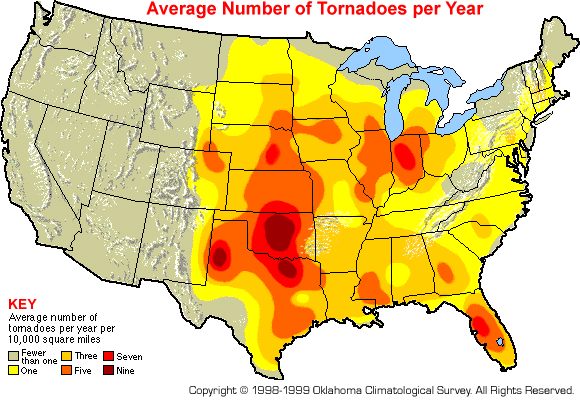I think the original question title implied a misunderstanding of what's happening. "What's the point with tornadoes?" implies that there is an intelligence with an intention that invented tornadoes for a purpose. Even if one believes in a literal divine intelligence that thought up how Earth does what it does, that intelligence was vastly smarter and more detail oriented than that wording implies, and it certainly didn't invent tornadoes as an afterthought. Tornadoes are just something that happens in liquids and gasses because complex math & physics (q.v. Advanced Fluid Dynamics & Meteorology). However if we ignore your wording, there is an answer to what good tornadoes do for life on Earth, and assuming that's what you mean, see below:
Depends on what you mean by "nature".
One view of "nature" includes everything natural, including tornadoes and volcanoes, which benefit nature in that they add something glorious and interesting that is itself a plus.
Another view might be that "nature" means life, and that an abundance of thriving living species is what is meant by "benefits" for nature.
Before considering what the positive aspects are for life, of a hurricane, I think it's important to consider what plants and animals generally do with their environment. Living things generally look for food, comfort, company, shelter, and so on, and try to stay alive and be happy. Even plants check out their local environment and make the best of it (e.g. they bend and grow leaves so as to get light, and sense and grow roots towards water, even inside your water pipes). Animals evolve and adapt to their conditions, and the conditions they create themselves, as well as to events.
Events are interesting because they aren't always there, so they may tend to shake up the situation and even kill many things that are adapted to that type of event not happening. But what's destructive for one type of life is often better for other types of life, particularly since life in the non-event condition may have started to dominate an area and create its own conditions (for example, dense bushes and trees blocking light and preventing other plants from using the same space). Over the course of many thousands of years, there even appear species adapted to rare events, such as floods. Some species even have reproductive cycles that wait dormant even for years waiting for a flood.
A hurricane is violent and destructive, but is also "just" an event such as a forest fire or other weather. Sure it kills a lot of things, but also:
It carries things long distances. This can be very nice for some kinds of life that might appreciate what gets brought to them that isn't normally where they are, whether it is food (e.g. newly broken wood and dead bodies are yummy to some other life forms) or shelter or nest materials or soil (many plants may like soil brought from other places - it's like someone's tilling or bringing them nutritious soil). It's also good for spreading seeds farther than they'd usually go. And small creatures such as worms and insects, not to mention small plants, lichens, moss, and fungus, may survive quite easily and so are being given great transportation to places they wouldn't easily get by themselves. Things can be brought across barriers such as rivers or even over mountains, deserts or seas this way.
Ripping away established heavy vegetation makes room for other plants to get sunlight and water and have room to grow where they otherwise couldn't. And as each species uses different nutrients and leaves different by-products, this can work a little like crop rotation, as the new plants may appreciate the soil used by the old trees, and eventually new trees may like what those plants have done to the soil.
Similarly, killing off or disrupting some animals may create opportunities for others.
New types of objects may be created by breakage, which may be useful to some species.
All the broken branches and debris may also make a fire more likely later sooner or later, which is a different type of event that creates different types of change and opportunity, which can be good in moderation.
Killing large trees can increase erosion, which is another kind of event that can open up new opportunities for different species.
Etc. In general, change is often good for other species, and the more species that have opportunity, the healthier the whole ecosystem tends to be, because there are more abundant types of resources that can fall into mutually supporting balance with each other. When circumstances stay the same for too long, then the few species that are best in those static conditions tend to overpopulate and strain their own resources, which can throw things out of balance and cause survival issues for their food, thus themselves, as well as other species.
So chaos and destruction can be good, in moderation.
As for what can deflect tornadoes, mountain ranges do the trick, but they need to be in the way of all tornado weather patterns, as you can see on this map of tornado-struck areas of the USA - the eastern ranges don't block tornadoes coming up from the south:


